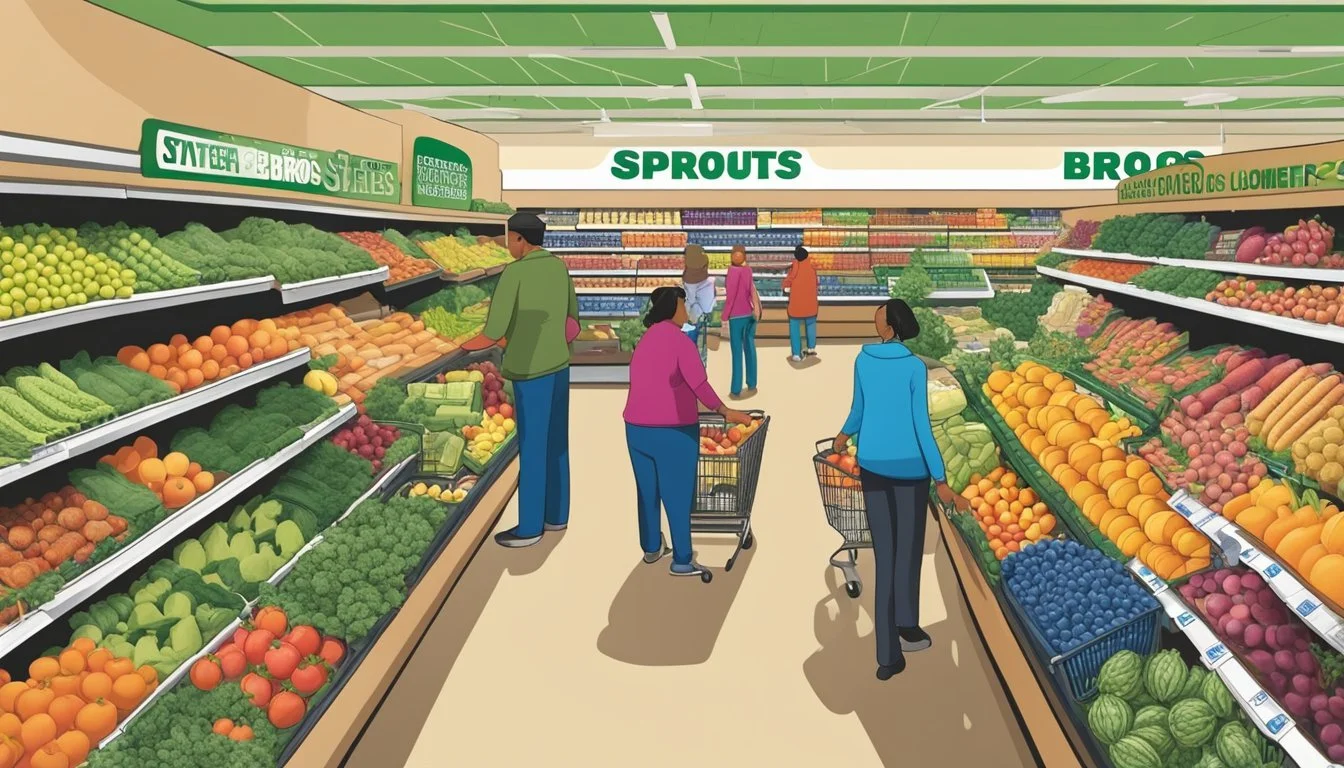Sprouts vs Stater Bros. Markets
A Comprehensive Comparison
Grocery shopping can be a significant part of weekly expenses, making the choice of store crucial for budget-conscious consumers. Sprouts and Stater Bros. Markets are two popular options, each with its own strengths and loyal customer base.
Sprouts is known for its focus on natural and organic products, offering a wide selection of fresh produce and health-conscious items. Sprouts typically provides prices about 14 percent lower than the average grocery store, making it an attractive option for those seeking healthier foods without breaking the bank. The store's layout and atmosphere often appeal to shoppers looking for a more boutique grocery experience.
Stater Bros. Markets, on the other hand, has built a reputation for quality meats and excellent customer service. The chain ranked highly in Consumer Reports' survey on the best places to grocery shop, earning praise for its competitive prices and the quality of its meat and poultry departments. This focus on meat quality and value can be a significant draw for many shoppers, especially those who prioritize protein in their diets.
Company Overview
Sprouts Farmers Market and Stater Bros. Markets are two distinct grocery chains operating in the United States. Both companies have unique histories, business models, and market positions that shape their offerings and appeal to different customer segments.
Brief History of Sprouts and Stater Bros. Markets
Sprouts Farmers Market began in 2002 in Chandler, Arizona. The chain was founded by Stan and Shon Boney, with a focus on natural and organic products. Sprouts quickly expanded across the southwestern United States, merging with other health food chains along the way.
Stater Bros. Markets has a longer history, dating back to 1936 when twins Cleo and Leo Stater opened their first store in Yucaipa, California. The company has remained primarily focused on Southern California, building a strong regional presence over the decades.
Business Models and Market Presence
Sprouts positions itself as a farmers market-style grocer, emphasizing fresh produce, bulk foods, and natural products. The chain operates over 350 stores across 23 states, competing with Whole Foods and Trader Joe's in the natural foods segment.
Stater Bros. Markets follows a more traditional supermarket model. It operates about 170 stores, all located in Southern California. The company focuses on providing quality products at competitive prices, targeting value-conscious shoppers.
Both chains face competition from larger national retailers like Walmart and Costco, as well as regional players like Publix in their respective markets.
Financial Performance and NASDAQ Listings
Sprouts Farmers Market is publicly traded on the NASDAQ under the ticker symbol SFM. The company has shown steady growth since its IPO in 2013, with annual revenues exceeding $6 billion in recent years.
Stater Bros. Markets, in contrast, is privately held. While specific financial data is not publicly available, the company is known to be one of the largest privately owned supermarket chains in Southern California.
Sprouts' public listing provides greater transparency into its financial performance and allows for easier comparisons with other publicly traded grocery chains. Stater Bros.' private status offers more flexibility in its business strategies but less public scrutiny of its financial metrics.
Product Selection and Quality
Sprouts and Stater Bros. Markets offer distinct product selections that cater to different consumer preferences. Both stores prioritize quality, but their focus areas and offerings differ significantly.
Produce: Organic and Conventional Options
Sprouts excels in its produce department, offering a wide array of organic and conventional fruits and vegetables. The store's layout often resembles a farmers market, with fresh produce prominently displayed. Sprouts typically stocks over 200 organic produce items, including seasonal and exotic varieties.
Stater Bros. Markets provides a more traditional produce section. While they offer organic options, their selection is not as extensive as Sprouts. Stater Bros. focuses on providing fresh, locally sourced produce at competitive prices.
Both stores prioritize quality, but Sprouts tends to have a larger variety of organic and specialty produce items.
Meat Department: Freshness and Variety
Stater Bros. Markets is known for its high-quality meat department. They offer a wide selection of fresh meat and poultry, including grass-fed and organic options. Their butchers provide custom cuts and personalized service.
Sprouts also maintains a strong meat department, focusing on natural and organic options. They offer 100% grass-fed beef, free-range chicken, and antibiotic-free pork. Sprouts' meat selection includes pre-marinated and prepared items for customer convenience.
Both stores prioritize freshness, but Stater Bros. may have an edge in traditional meat offerings and butcher services.
Deli and Prepared Foods
Stater Bros. Markets features a full-service deli with a variety of sliced meats, cheeses, and prepared salads. They offer hot foods and made-to-order sandwiches.
Sprouts' deli department focuses on healthier options. They provide a selection of prepared salads, sandwiches, and entrees made with natural and organic ingredients. Sprouts also offers a salad bar and hot food bar with rotating daily specials.
The prepared food options at both stores cater to different preferences, with Sprouts leaning towards healthier, organic choices.
Specialty and Allergen-Free Products
Sprouts excels in offering specialty and allergen-free products. They have a wide selection of gluten-free, dairy-free, and vegan options throughout the store. Sprouts also carries a variety of natural supplements and body care products.
Stater Bros. Markets has expanded its specialty product offerings in recent years. They now stock a growing selection of gluten-free and organic foods. However, their range is not as extensive as Sprouts.
For customers with specific dietary needs or preferences, Sprouts generally provides a broader selection of specialty and allergen-free products.
Pricing Strategies and Customer Perceptions
Sprouts and Stater Bros. Markets employ distinct pricing approaches to attract and retain customers. Their strategies impact how shoppers perceive value and quality in relation to cost.
Affordability and Price Comparison
Sprouts offers prices 14% lower than the average grocery store, positioning itself as a more affordable option for health-conscious consumers. The company focuses on competitive pricing for its produce and bulk items. Stater Bros. Markets, known for its "low prices every day" motto, aims to provide consistent value across its product range.
A typical family spending $250 weekly on groceries could save $35-$72.50 by shopping at Sprouts, based on industry averages. Stater Bros. Markets' everyday low pricing model may result in similar savings, though exact figures vary by location and product mix.
Deals and Promotional Offers
Sprouts runs weekly specials and a "72-Hour Sale" featuring deep discounts on select items. Their mobile app provides digital coupons and personalized deals. Stater Bros. Markets offers weekly ad specials, digital coupons, and a loyalty program that provides additional savings opportunities.
Both chains use promotional strategies to enhance price perception:
Sprouts: Bulk bin sales, BOGO offers on vitamins
Stater Bros.: Mix-and-match deals, fuel rewards program
These tactics aim to increase perceived value and encourage customer loyalty.
Perceived Value and Quality for Money
Sprouts emphasizes its fresh, natural, and organic offerings to justify slightly higher prices on certain items. The store layout and atmosphere contribute to a perception of higher quality. Stater Bros. Markets focuses on delivering consistent value across a wide range of products, including both national brands and private label options.
Customer perception of value often extends beyond price:
Product freshness
Store cleanliness
Staff friendliness
Checkout efficiency
Both chains invest in these areas to enhance overall shopping experience and justify their pricing strategies. Sprouts' friendly staff and Stater Bros.' community involvement contribute to positive customer perceptions, potentially offsetting price concerns for some shoppers.
Store Experience and Customer Service
Sprouts and Stater Bros. Markets offer distinct shopping experiences, with each prioritizing different aspects of customer service and store amenities. Both chains strive to create welcoming environments for their shoppers.
Amenities and Store Layout
Sprouts focuses on a farmers market-inspired layout, emphasizing fresh produce and natural products. Their stores feature wide aisles and open floor plans, making navigation easy. Bright lighting and earthy tones create an inviting atmosphere.
Stater Bros. Markets opts for a more traditional supermarket layout. Their stores are typically larger, with clearly defined sections for different product categories. The meat department is a focal point, reflecting their reputation for quality meats.
Both chains offer self-checkout options for customer convenience. Sprouts provides bulk bin sections for shoppers to purchase precise quantities of grains, nuts, and snacks. Stater Bros. often includes in-store pharmacies and expanded deli sections.
Staff Expertise and Service Quality
Sprouts invests in training staff on natural and organic products, enabling them to assist customers with specific dietary needs or preferences. Employees are knowledgeable about the store's unique offerings and can provide recommendations.
Stater Bros. Markets is known for its strong customer service. Their 2017 Consumer Reports ranking praised the quality of staff interactions. Employees are often long-term, contributing to a sense of community within stores.
Both chains prioritize friendly and efficient cashiers to minimize wait times. Sprouts offers product demonstrations and sampling, allowing customers to try new items. Stater Bros. emphasizes personalized service in their meat department.
Customer Feedback and Satisfaction
Sprouts receives positive feedback for its product selection and store atmosphere. Customers appreciate the focus on health-conscious options and the ability to discover new items. Some shoppers note higher prices compared to traditional grocers.
Stater Bros. Markets consistently ranks well in customer satisfaction surveys. Their competitive pricing and quality meat offerings are frequently cited as strengths. The chain's community involvement also contributes to positive customer perceptions.
Both stores face challenges in the evolving grocery landscape. Sprouts competes with Whole Foods and Amazon Prime for health-conscious shoppers. Stater Bros. works to balance traditional strengths with modernizing their shopping experience to meet changing consumer expectations.
Sustainability and Ethical Practices
Sprouts Farmers Market and Stater Bros. Markets both emphasize sustainability and ethical practices in their operations. Their efforts focus on environmental initiatives, animal welfare, and community involvement.
Environmental Initiatives and Footprint
Sprouts Farmers Market has made significant strides in environmental protection. The company publishes annual Environmental, Social, and Governance (ESG) reports detailing its sustainability efforts. These reports highlight Sprouts' commitment to reducing its carbon footprint and energy consumption.
Stater Bros. Markets also demonstrates a strong commitment to environmental protection. The company has implemented sustainable business practices aimed at energy reduction, carbon footprint reduction, and water conservation.
Both retailers have ongoing recycling efforts to minimize waste. Sprouts' open layout store design emphasizes fresh produce, potentially reducing packaging waste.
Animal Welfare and Ethical Meat Sourcing
Sprouts Farmers Market is known for offering a wide selection of organic and natural meat products. The company likely sources from suppliers who prioritize animal welfare, though specific details are not provided in the search results.
Stater Bros. Markets' meat department has received mixed reviews from customers. Some report high-quality USDA Choice cuts with good marbling, while others have experienced disappointment with their purchases.
Neither company's specific policies on grass-fed beef, hormones, or antibiotics use are mentioned in the available information. Customers concerned about these issues may need to inquire directly with each store.
Community Involvement and Local Sourcing
Sprouts Farmers Market emphasizes its commitment to local communities. The company's 2023 Impact Report likely details its efforts in this area, though specific examples are not provided in the search results.
Sprouts' focus on offering fresh produce and better-for-you products aligns with its goal of inspiring wellness naturally. This approach may involve partnerships with local farmers and producers.
Information about Stater Bros. Markets' community involvement and local sourcing practices is not available in the given search results. Customers interested in these aspects may need to research further or ask store representatives directly.
Market Position and Consumer Trends
Sprouts and Stater Bros. Markets occupy distinct positions in the grocery landscape, shaped by evolving consumer preferences and industry dynamics. Each chain faces unique challenges and opportunities in responding to health trends and competitive pressures.
Changing Customer Preferences
Consumers increasingly seek fresh, high-quality produce and organic options. Sprouts has capitalized on this trend, positioning itself as a specialty grocer focused on natural and organic foods. The chain offers an extensive produce section and bulk foods department.
Stater Bros. Markets maintains a more traditional supermarket format but has expanded its organic and natural offerings to meet changing demands. The company emphasizes its meat department quality and selection as a key differentiator.
Both chains have adapted their product mix and store layouts to cater to customers looking for convenient, prepared meal options and grab-and-go items.
Health and Diet Trends Influencing Selection
The rise of plant-based diets and increased awareness of food sensitivities has impacted grocery offerings. Sprouts provides a wide array of vegetarian, vegan, and gluten-free products throughout its stores.
Stater Bros. has expanded its selection of organic produce and natural foods but maintains a strong focus on conventional grocery items. The chain has introduced more health-conscious options in its prepared foods section.
Both retailers have increased signage and product labeling to highlight nutritional information and dietary attributes, helping customers make informed choices.
Competitors and Industry Ranking
In the competitive Southern California market, Sprouts and Stater Bros. face pressure from national chains like Kroger and Albertsons, as well as specialty retailers such as Trader Joe's and Whole Foods.
Stater Bros. ranked 9th in Consumer Reports' survey of best grocery stores nationwide, indicating strong customer satisfaction. The chain's regional focus allows for tailored offerings and community engagement.
Sprouts competes more directly with natural foods retailers and has expanded rapidly in recent years. The company's emphasis on produce and bulk foods helps differentiate it from conventional supermarkets.
Both chains must continually innovate to maintain their market positions against competitors like Aldi, which offers low prices, and Wegmans, known for its expansive selection and prepared foods.
Conclusion
Sprouts and Stater Bros. Markets offer distinct shopping experiences for grocery buyers. Sprouts excels in providing a wide array of organic and natural products, appealing to health-conscious consumers.
Stater Bros. Markets, on the other hand, stands out for its competitive pricing and quality meat department. The chain has earned recognition for its customer service and affordable options.
Both stores cater to different needs within the American grocery landscape. Sprouts has expanded its presence in states like Arizona, while Stater Bros. remains a regional favorite in Southern California.
Ultimately, the choice between these two supermarkets depends on individual preferences. Those prioritizing organic selections may lean towards Sprouts, while budget-conscious shoppers might prefer Stater Bros.
Each chain has carved out its niche in the competitive grocery industry. As consumer habits evolve, both stores continue to adapt their offerings to meet changing demands.






